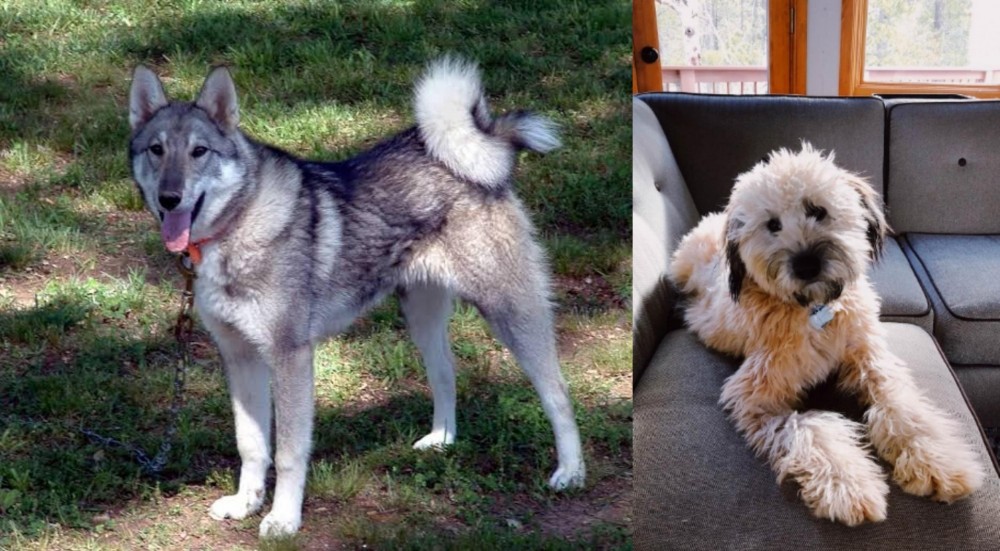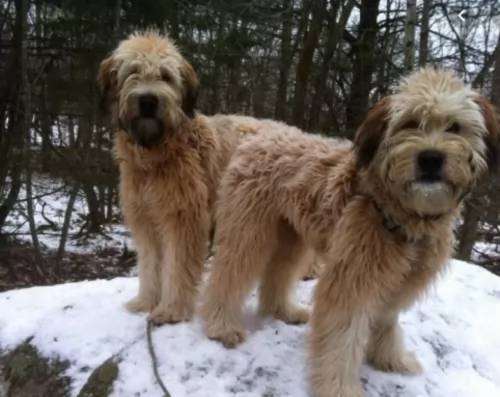 Petzlover
Petzlover West Siberian Laika is originated from Russia but Whoodles is originated from United States. West Siberian Laika may grow 11 cm / 5 inches higher than Whoodles. Both West Siberian Laika and Whoodles are having almost same weight. Both West Siberian Laika and Whoodles has almost same life span. West Siberian Laika may have more litter size than Whoodles. West Siberian Laika requires Low Maintenance. But Whoodles requires Moderate Maintenance
West Siberian Laika is originated from Russia but Whoodles is originated from United States. West Siberian Laika may grow 11 cm / 5 inches higher than Whoodles. Both West Siberian Laika and Whoodles are having almost same weight. Both West Siberian Laika and Whoodles has almost same life span. West Siberian Laika may have more litter size than Whoodles. West Siberian Laika requires Low Maintenance. But Whoodles requires Moderate Maintenance
 The West Siberian Laika come from the Khanty and Mansi tribes of West Siberia and Ural. They are a primitive breed used for hunting and come from the spitz and wolf lines. They retain many of their primitive looks and traits to this day. They were pre-historic companions to human hunters and remain so today in the northern regions of the Russia. They were never sled dogs but pure hunters throughout their journey to a domesticated breed. They hunted in the forests of the mountainous regions and were adapted to hunting in the woods. When their prey was hunted almost to extinction, the Laikas were also in danger of disappearing.
The West Siberian Laika come from the Khanty and Mansi tribes of West Siberia and Ural. They are a primitive breed used for hunting and come from the spitz and wolf lines. They retain many of their primitive looks and traits to this day. They were pre-historic companions to human hunters and remain so today in the northern regions of the Russia. They were never sled dogs but pure hunters throughout their journey to a domesticated breed. They hunted in the forests of the mountainous regions and were adapted to hunting in the woods. When their prey was hunted almost to extinction, the Laikas were also in danger of disappearing.
From the early days of the 1900’s through the first World War, there were several campaigns to save the WSL from extinction. A breed standard was developed around the 1930’s. Following the war the breeding programs became more uniformed and followed the standard that was in place. World War II disrupted it again, but once again it was resumed after the war.
The breed was once again threatened by industrialization and deforestation in the early 20th century, as they were replaced by newer, more popular breeds. There were thought to be dozens of aboriginal Laikas with various groups attached to different groups of indigenous hunters.
Following the second World War and the ever increasing detail of breed standards, the Laikas were divided into four pure bred groupings: the West Siberian Laika, the East Siberian Laika, the Russ-European Laika and the Karelo-Finnish Laika. All of these breeds are Laikas because they are bark pointing hunters.
They were imported to the U.S. in the early 1990’s by a Russian immigrant. Vladmir Beregovoy is credited with bringing the breed to the States. There are now about 300-400 West Siberian Laika’sin the U.S. They are a very emotional breed, very in touch with his human’s feelings, habits and intentions. He is a barker for sure who hates to be left alone. An intense breed with the need for companionship and a purpose. They will do anything to escape a pen if left alone for long periods of time.
The breed is protective of its people with other animals and some are wary of strangers. He needs an active family to match his active spirit. They will bark at all wild life including all the squirrels in your yard. So if don’t want a “barker”, don’t get a West Siberian Laika.
They are recognized by the United Kennel Club, the American Canine Association the Dog Registry of American and the Federation Cynologique Internationale
 Known also as the Wheatenpoo or the Wheatendoodle, the Whoodle is a teddy-bear kind of mixed-breed dog, being a cross between Poodles and the soft-coated Wheaten Terrier.
Known also as the Wheatenpoo or the Wheatendoodle, the Whoodle is a teddy-bear kind of mixed-breed dog, being a cross between Poodles and the soft-coated Wheaten Terrier.
He came about in the mid-1900s so he is still quite a new breed. Like with most hybrid breeds, the Whoodle doesn’t have a well-documented history.
Because most hybrids hail from the USA, one can assume that the Whoodle comes from there as well.
 The WSL comes from the Spitz line and also directly descendent from the wolf. They look and act a lot like a wolf in many ways. They have retained much of their primitive traits. With a pointed, long muzzle, an almost square head, and square body, they have wolf colored coats of gray and red. They are mostly medium in size but some can be smaller or larger. Their head is shaped like a wedge, their eyes are typical almond shape and set deep in their head. They are brown or even darker. The muzzle is almost as long as the skull. Their lips are thin and black. The ears are straight up and pricked.
The WSL comes from the Spitz line and also directly descendent from the wolf. They look and act a lot like a wolf in many ways. They have retained much of their primitive traits. With a pointed, long muzzle, an almost square head, and square body, they have wolf colored coats of gray and red. They are mostly medium in size but some can be smaller or larger. Their head is shaped like a wedge, their eyes are typical almond shape and set deep in their head. They are brown or even darker. The muzzle is almost as long as the skull. Their lips are thin and black. The ears are straight up and pricked.
They have bodies longer than they are tall with a lot of musculature. They carry their tail high over their backs. With straight legs and forward feet, with gray, red and white coats, they still look like wild dogs.
 The Whoodle is a medium-sized dog that stands at between 30 and 50cm in height and weighs in the region of 9 to 20kg.
The Whoodle is a medium-sized dog that stands at between 30 and 50cm in height and weighs in the region of 9 to 20kg.
He has a silky, medium-length coat that can be fairly straight or wavy and which is available in a range of colors – black, brown, grey, cream and red.
He isn’t a heavy shedder, but their hair can grow fairly long so he will have to be groomed one way or the other. Many people choose to have him trimmed at the doggy salon. With the Poodle being in the mix, it is thought that the Whoodle coat is hypoallergenic, sought after by dog owners who suffer from allergies.
Just because of the dog breeds your Whoodle dog comes from, you can know that you’re going to have a playful, happy, friendly, outgoing, social pet who will have no doubt inherited a lot of good qualities from both parent breeds.
He will happily settle down with you in the city or the countryside. He absolutely loves human company and isn’t the kind of dog to be put outside for hours separated from his humans.
If there are children in the home, they’ll discover that this little dog is always up for a game. He gets on well with children and other pets. Early training and socialization will be imperative for the Whoodle as he is a strong-willed dog, inclined to be stubborn and you want to make sure he is obedient.
 3.Adaptability This is not really an apartment dog though he can adapt. He needs outdoor space to run everyday. So if in an apartment find a dog park for everyday use.
3.Adaptability This is not really an apartment dog though he can adapt. He needs outdoor space to run everyday. So if in an apartment find a dog park for everyday use.
4.Learning ability – Highly trainable and very smart. Independent thinker though might cause some issues.
 The Whoodle is a hybrid dog – a mix between the soft-coated wheaten terrier and the poodle.
The Whoodle is a hybrid dog – a mix between the soft-coated wheaten terrier and the poodle.
They make splendid pets and companions and are cheerful and intelligent, wanting to be constantly by your side.
Because both of the parents are working dog breeds, he is an active dog too, loving to take part in all the activities his family is busy with.
When you bring this little teddy bear of a dog into your home, you’re going to have years of benefiting from a true canine companion.
 Health wise there are no genetic health issues known today. Since they were so wild, primitive and isolated there was not a lot of inbreeding to any standards. There are however some interesting health facts about the WSL.
Health wise there are no genetic health issues known today. Since they were so wild, primitive and isolated there was not a lot of inbreeding to any standards. There are however some interesting health facts about the WSL.
• Females only come into estrus once a year, usually in the late winter. They are usually one to two or two and a half years old when this happens. The Russians who know them best frown on breeding them before they are at least two.
• They are subject to many of the same parasites and some diseases like any other canine. But they are not susceptable to any illness specific to their breed.
• Hunting accidents might bet he biggest health threat this breed faces at the moment.
• However with more dogs being bred for the show ring, this could all change and genetic issues could begin to pop up for them.
 The Whoodle is considered to be a healthy little dog but they can suffer from some of the many common dog illnesses there are. It’s important to feed your dog well and to exercise him to ensure his good health. Some of the common health problems he could suffer with -
The Whoodle is considered to be a healthy little dog but they can suffer from some of the many common dog illnesses there are. It’s important to feed your dog well and to exercise him to ensure his good health. Some of the common health problems he could suffer with -
It is important to ensure your Whoodle has his vaccines to prevent some of the deadly canine diseases there are.
Also, it is a good idea to have your pet neutered or spayed to prevent an unwanted litter. Spaying and neutering have health benefits for your pet, so it is a good idea to have this done for them.
 performance, working dog food. High in protein and fat is needed to maintain their lean muscle. Don’t over feed them as they will become obese and they will be unhappy if their physical activities are restricted, even if by their own weight. Be sure you break up their day’s food amount into 3-4 smaller meals.
performance, working dog food. High in protein and fat is needed to maintain their lean muscle. Don’t over feed them as they will become obese and they will be unhappy if their physical activities are restricted, even if by their own weight. Be sure you break up their day’s food amount into 3-4 smaller meals.
2.Feeding the adult – Almost everything is equally true for the adult. They need a high protein and high fat food – a high performance food. Don’t over feed and give them at least 2 meals per day.
3.Points for Good Health – as previously mentioned this is a hardy and robust breed,
4. Games and Exercises They need a lot of exercise, have a strong prey drive and are very intelligent. A dog with those traits that does not get enough exercise will drive you crazy if he is not stimulated.
 Apart from your Whoodle requiring regular nail trimming, you will want to brush him twice a week to keep their coat free from matting. Some Whoodle owners prefer to have their pets professionally groomed.
Apart from your Whoodle requiring regular nail trimming, you will want to brush him twice a week to keep their coat free from matting. Some Whoodle owners prefer to have their pets professionally groomed.
Check inside his mouth while grooming to ensure there are no bad teeth. This could cause your pet a lot of pain and he has no way of telling you this.
As a medium-sized dog, you want to feed your pet a commercially manufactured dog food that has been formulated for a medium-sized dog and one with lots of energy.
Their dietary needs change from puppyhood to adulthood and where the puppy received 4 bowls of food a day, the adult Whoodle will require 2. Always buy the best quality food you can as the choice of food you provide has a huge impact on his health.
Some home-made food is always a good idea too but it needs to be simple and plain, without any exotic spices. Boiled chicken, rice and vegetables is always a splendid choice and it can be added to the dry kibble as a supplement.